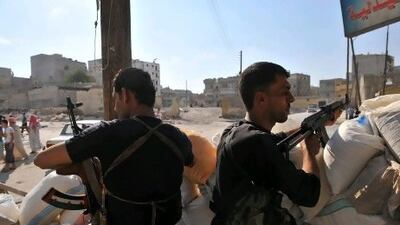BEIRUT //The fighting in Aleppo intensified yesterday - and the rebels believe the battle for the city will be as important as Benghazi was for the Libyan rebels, said an activist.
Rami Abdel Rahman, the director of the Syrian Observatory for Human Rights, confirmed that the rebels had sent reinforcements to Aleppo, which prompted the regime to respond by deploying more forces in the fight for control of Syria's largest city.
Warplanes overflew the city, breaking the sound barrier but not opening fire, said Mr Rahman.
"The rebels are sending numerous fighters to Aleppo to battle the regime", he said. "For them, Aleppo is as important as Benghazi was for the Libyan rebels.
"Aleppo is the capital of the north and the northern regions are already in their hands so, if this city falls, the regime is over and the two sides know it," he said.
"Hundreds of rebels from allover north Syria are arriving in Aleppo, which appears to have become the decisive battle,"said a journalist for a Syrian newspaper.
"Around a dozen districts on the outskirts of the city are in the hands of the rebels and you can hear the sound of bombardment and automatic gunfire."
Opposition fighters have been pushing into the centre of the city, Syria's commercial hub, since fighting between government forces and rebels erupted there on Sunday.
Regime forces have also stepped up attacks and the Syrian military has sent in more troops in a bid to crush the armed revolt.
The opposition Observatory reported some government reinforcements have been targeted by the rebels, including an attack yesterday where roadside bombs hit a convoy of security forces en route to the city, killing eight.
A government security source said the key battle was in areas between Aleppo city and the airport, "which are in the hands of the terrorists".
Louay Almokdad, a logistics coordinator with the Free Syrian Army (FSA), said rebels are holding some 40 per cent of the city and about 80 per cent of Aleppo's surrounding areas. These reports could not be independently confirmed.
"The fighting is ongoing," he said.
The Aleppo-based activist Mohammed Saeed said there have been fierce battles in neighbourhoods all over the city.
"The situation in Aleppo is currently very difficult," hesaid. "Shooting and clashes are going on nonstop."
The opposition Local Coordination Committees (LCC) reported at least 17 people killed yesterday in fighting in Aleppo.
Across Syria, at least 100 people, including 10 children, were killed yesterday, the LCC said, with 25 of the dead from Damascus, including in Qaboon where there were reports of execution-style killings.
Activists said they found the bodies of 11 men in the Damascus neighbourhood yesterday, who were believed to have been executed by forces loyal to the regime of President Bashar Al Assad.
Video footage posted online showed bloodied bodies some with bullet wounds to the sides of their heads. Several of the men were found lying on the ground in pools of blood with their shirts pulled up over their heads.
Rania Al Midani, an opposition activist who lives near Qaboon, said the men were arrested five days ago in a nearby district.
"Activists found them [on Wednesday] in Tishreen alley. They thought these men were in jail. They could only enter the alleyway today to find their bodies as it was previously occupied by [pro-regime militia] shabbiha," she told Reuters.
In Damascus, government forces are reportedly still carrying out military operations. Helicopter gunships and heavy machine-gun fire pounded the neighbourhood of Al Hajar Al Aswad yesterday, according to the Observatory. The LCC reported explosions in the area of Tadamoun.
Yesterday, international human rights group Amnesty International raised concern about reports of government and opposition forces killing captured opponents and urged all sides to abide by international law.
"In armed conflict, all parties, including armed opposition groups, are legally bound by the rules of international humanitarian law [IHL]. Serious violations of IHL are war crimes, and those responsible can expect to be brought to account in the future," Ann Harrison, Amnesty's deputy Middle East and North Africa programme director, said in a statement.
Turkey, meanwhile, announced the temporary closure of its borders with Syria to commercial traffic yesterday due to the deteriorating security situation, effectively suspending trade with Syria, a relationship that was once worth almost US$3 billion (Dh11bn).
The volume of traffic across the border had, however, reportedly dropped by 87 per cent since the uprising against the Al Assad regime began 16 months ago.
In recent days, rebel fighters seized control of three crossings on the Syrian side of the border.
Turkey's customs minister Hayati Yazici said Turkish citizens would not be able to cross into Syria but the borders are still open for Syrian refugees escaping the violence.
Lieutenant General Babacar Gaye, the new commander for the 300-member United Nations observer mission, arrived in Damascus yesterday along with the UN's peacekeeping chief, Herve Ladsous.
There are now about 150 of the unarmed military observers in Syria, members of a mission that is part of UN-Arab League special envoy Kofi Annan's peace plan.
Mr Ladsous said he had told Syrian officials that without a significant reduction in violence, the remaining observers would leave on the expiry of the "final" 30-day extension of the mission's mandate agreed by the Security Council on July 20.
* With additional reporting by Reuters, Associated Press and Agence France-Presse

